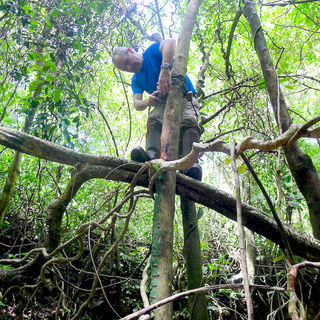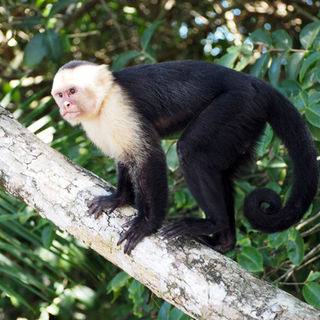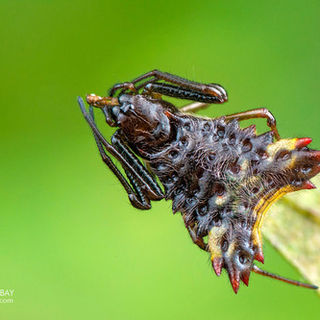

Details
Cost: $3,200
Dates: June 5th, 2026 - June 14th, 2026
Country: Panama
Expedition Language: English
Closest Airport: Tocumen International Airport, Panama City
Accommodation type: 2 nights hotel. 7 nights tent camping on raised platforms
Minimum Age: 18
Solo travelers welcome!
Project Summary
Our research focuses on insect community structure across forest strata, or documenting the species that live at various forest levels. In 2026, our focus will be on Coleoptera, or beetles. Using a variety of trapping methods, including custom built flight intercept traps, we'll survey the Coleoptera diversity from the forest floor to the canopy.
We'll also be mapping Leafcutter Ant Highways, surveying aquatic insects in the Mamoni River, and sifting through coarse woody debris (dead logs) for beetle larvae.
Where we work.
Nestled amidst the intersection of Central and South America lies a secluded valley enveloped within one of the world’s lowest-elevation cloud forests. This unique habitat in Panama stands as a vital sanctuary for migratory wildlife and harbors a remarkable ensemble of endemic plant and animal species found nowhere else. This richly biodiverse landscape holds immense potential for entomological exploration and discovery. This is also one of the best areas for birdwatching and ornithologists with well over 200+ incredible species recorded in this small reserve. We’ll be staying in a 100% solar, off-grid, hand-built biological field station called Cocobolo Nature Reserve.
Activities
-
Flight Intercept Trap Build.
-
Team Research Projects
-
-
Leaf-cutter Ant Highways & Host Plants
-
Coarse Woody Debris Survey
-
Ground, Dung, & Carrion Beetle Trapping.
-
-
Cloud Forest Trekking
-
Mamoni River: Swimming & Aquatic Insect Survey
-
Mercury Vapor and/or UV Light Sheet Every Night
-
Night Walks with UV Flashlights
-
Guided Ecology & Wildlife Hikes
-
Guided Bird Walks
-
Insect Collection & Pinning (all donated to the University of Panama upon completion of our research)
-
Identification Workshop
-
Rainforest Bioblitz
-
Assist in other research projects (optional)
Gallery

Our Partner Station
Cocobolo Nature Reserve is a privately owned reserve managed by CREA: Conservation through Research, Education, and Action.
Watch the video to see about the station, its mission, and a few extras from our last expedition.
And if you'd like to support their great work, you can find more about them by clicking their logo.
Meet Your Expedition Leaders
Important Disclaimers
We will be spending a majority of our time in dense and humid jungles in wildlife rich areas. We’ll be wading through rivers, climbing trees, and trekking through brush and mud. You’ll get dirty… and that’s half the fun, however, please consider the disclaimers below. And keep in mind, all activities are optional, so if you need a rest or don’t feel like participating one day, you’re more than welcome to relax on the property.
COMFORTABILITY: We do have internet and electricity (the station is 100% solar), but this is a completely off-grid biological field station. You will be sleeping in tents on raised platforms for a majority of our expedition. It’s not a 5-star resort. While we do provide you with air mattresses, tents, and sleeping bags, please bring whatever else you may need to ensure your comfort in this environment. (I recommend a portable rechargeable fan if you're heat sensitive at night)
Personal space is limited. You will share tent platforms, bathhouses, and common spaces with the rest of the participants, researchers, and field guides.
THERE IS NO HOT WATER – We will have a shared bath-house with shower stalls (cold-water only) and composting toilets.
We’d be happy to try to accommodate any personal requests you have, but please note that resources are limited.
MEDICAL: Biting and painful stinging insects as well as venomous snakes and other predators are present. Bullet ants are plentiful - and while they are not fatal or pose long-term risks (unless you have an allergy to hymenoptera venom) their stings are very painful. There has never been a medical emergency at Cocobolo Nature Reserve, but please exercise caution and follow our safety instructions at all times. We cannot control the wildlife, terrain or weather. If you have any allergies to hymenoptera venom (bees, ants, wasps) please reconsider participation or bring your doctor prescribed epinephrine. While we are Wilderness First Responder Certified, this really only means we’re certified to assess emergency situations and provide extremely basic emergency care… we are not medical doctors.
Our Expedition Includes:
Accommodation:
-
2 nights accommodation in Panama City for the first and last nights, and all accommodation/station fees at Cocobolo
-
Sleeping bags, air mattresses, and tents
Transportation:
-
Pickup & dropoff from our hotel in Panama City to/from Cocobolo Nature Reserve
Food & Beverage:
-
-
1x Dinner in Panama City
-
Breakfast, lunch, dinner, snacks, and beverages throughout stay at Cocobolo. On final day, only breakfast is included.
-
Staff:
-
Wilderness First Response certified expedition leaders, Cocobolo guides and researchers, drivers, cooks.
Our Expedition DOES NOT include:
-
Flights
-
Transportation to our hotel on Day 1 - Ubers are plentiful and shouldn't cost more than $20 USD
-
Breakfast or lunch on Day 1
-
Lunch or Dinner on Day 9
-
Toiletries
REQUIRED PACKING:
-
Muck boots
-
2 large water bottles or large camelbak.
Suggested packing list:
While we have a lot of experience packing for such field trips, it may be a bit confusing or intimidating if this is your first trip to the tropics. We’ve compiled a list of items you may want to consider below.
-
Field clothes (long trousers, long-sleeved shirts, T-shirts, hat/cap. We recommend regular changes due to humidity and rain)
-
Camp clothes (shorts, several t-shirts, walking sandals or light shoes)
-
Any other bedding besides the supplied tent, air mattress, and sleeping bags
-
Swimwear
-
Additional towel
-
Small backpack to carry water/lunch/camera in the forest (~20 L)
-
Something to protect electronic equipment from humidity
-
Refillable water bottle/hydration bag (recommended size: 32 ounces/ 1 litre)
-
Toiletries
-
Prescription medicine if any (allergies and other)
The following items are non-essential but may come handy:
-
Your favourite snacks (chocolate, cereal bars, trail mix, etc.)
-
Pajamas or night clothes
-
Light fingerless gloves for trekking in the forest (hand protection)
-
Solar camping shower (sorry, we only have cold showers at the field station!)
-
Electronics: camera, phone/tablet, e-reader and chargers
-
USB Power Bank for your phone/tablet/e-reader
-
Biodegradable laundry soap – we have sinks and clothes lines (no washer/dryer)




































